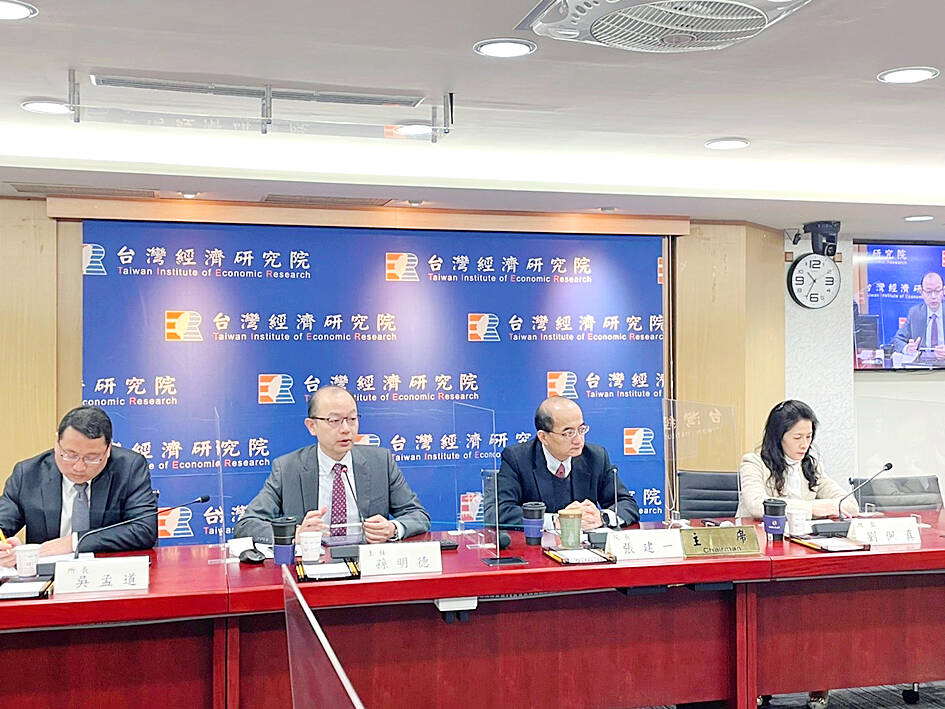Business confidence last month declined as companies fretted about US threats of “reciprocal” tariffs, but breathed a sigh of relief after Washington and Beijing agreed to step back from an all-out trade war, a survey by the Taiwan Institute of Economic Research (TIER, 台灣經濟研究院) found yesterday.
Business sentiment among local manufacturers came in at 90.9, a drop of 3.53 points from March to a two-year low and down for three months straight, as firms sought unsuccessfully to make sense of US President Donald Trump’s trade policy.
Trump on April 2 announced heavy “reciprocal” tariffs on US trade partners, including 32 percent on Taiwanese goods, but declared a 90-day pause a week later.

Photo courtesy of TIER
The backdrop explained why only 18.2 percent of manufacturers reported better performance last month, a plunge of 14.4 percentage points from one month earlier, the institute said.
Meanwhile, companies that posted a decline in business soared 12.7 points to 37.4 percent, it said.
Asked about prospects, 22.9 percent expect their business to improve in next six months, rising from 19.4 percent one month earlier, while manufacturers with a pessimistic outlook dropped 3.7 percentage points to 29.2 percent, the survey showed.
The easing in trade tensions between the US and China late last month prompted global companies to take advantage of the 90-day respite and build inventory, despite lingering uncertainty, TIER Economic Forecasting Center director Gordon Sun (孫明德) said.
The Taiwanese economy might still grow 3 percent this year if Trump demonstrates flexibility and softens tariffs on imports from around the world, TIER president Chang Chien-yi (張建一) said.
Chang expressed hope that the US might set a 15 percent tariff on Taiwan’s goods if bilateral trade talks fare well.
The confidence reading on service providers weakened 3.03 points to 85.41, as financial firms and hospitality operators took a hit from the stock rout and the New Taiwan dollar’s sharp appreciation affected the profitability of exporters and life insurers, Sun said.
While private consumption held resilient and lent support to sales of wealth management products, economic uncertainties at home and abroad warranted a cautious approach in doing business generally, the economist said.
The sentiment gauge for construction firms and real-estate brokers slid 2.98 points to 90.38, falling for four consecutive months, TIER’s Taiwan Industry Economics Database researcher Arisa Liu (劉佩真) said.
Liu said the housing market has slowed for a while and might not turn around anytime soon, in light of the central bank’s continued loan restrictions and the US tariff drama.
Nvidia Corp’s plan to expand its presence in Taipei’s Shilin District (士林) would benefit the neighborhood, but is not strong enough to bolster the whole market, Liu said.

JITTERS: Nexperia has a 20 percent market share for chips powering simpler features such as window controls, and changing supply chains could take years European carmakers are looking into ways to scratch components made with parts from China, spooked by deepening geopolitical spats playing out through chipmaker Nexperia BV and Beijing’s export controls on rare earths. To protect operations from trade ructions, several automakers are pushing major suppliers to find permanent alternatives to Chinese semiconductors, people familiar with the matter said. The industry is considering broader changes to its supply chain to adapt to shifting geopolitics, Europe’s main suppliers lobby CLEPA head Matthias Zink said. “We had some indications already — questions like: ‘How can you supply me without this dependency on China?’” Zink, who also

Taiwan Semiconductor Manufacturing Co (TSMC, 台積電) received about NT$147 billion (US$4.71 billion) in subsidies from the US, Japanese, German and Chinese governments over the past two years for its global expansion. Financial data compiled by the world’s largest contract chipmaker showed the company secured NT$4.77 billion in subsidies from the governments in the third quarter, bringing the total for the first three quarters of the year to about NT$71.9 billion. Along with the NT$75.16 billion in financial aid TSMC received last year, the chipmaker obtained NT$147 billion in subsidies in almost two years, the data showed. The subsidies received by its subsidiaries —

The number of Taiwanese working in the US rose to a record high of 137,000 last year, driven largely by Taiwan Semiconductor Manufacturing Co’s (TSMC, 台積電) rapid overseas expansion, according to government data released yesterday. A total of 666,000 Taiwanese nationals were employed abroad last year, an increase of 45,000 from 2023 and the highest level since the COVID-19 pandemic, data from the Directorate-General of Budget, Accounting and Statistics (DGBAS) showed. Overseas employment had steadily increased between 2009 and 2019, peaking at 739,000, before plunging to 319,000 in 2021 amid US-China trade tensions, global supply chain shifts, reshoring by Taiwanese companies and

At least US$50 million for the freedom of an Emirati sheikh: That is the king’s ransom paid two weeks ago to militants linked to al-Qaeda who are pushing to topple the Malian government and impose Islamic law. Alongside a crippling fuel blockade, the Group for the Support of Islam and Muslims (JNIM) has made kidnapping wealthy foreigners for a ransom a pillar of its strategy of “economic jihad.” Its goal: Oust the junta, which has struggled to contain Mali’s decade-long insurgency since taking power following back-to-back coups in 2020 and 2021, by scaring away investors and paralyzing the west African country’s economy.